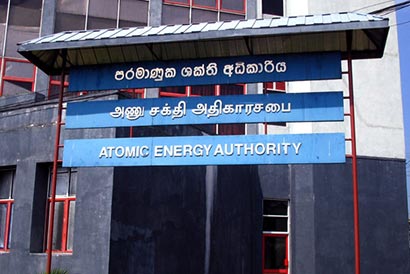Container of radioactive goods seized at Colombo Port

Sri Lanka Customs has detained a container load of highly radioactive stainless steel and aluminium household articles imported from India.
Tests conducted by the Atomic Energy Authority of Sri Lanka have determined that the goods (125 items) unloaded at the Colombo Port on Thursday contained high concentrations of Cobalt 60, a radioactive substance usually used to treat cancer.
The Authority has banned the entry of these goods to the market.
The radioactive nature of the goods was revealed in a routine scan by radiation scanners installed at the Colombo Port by the Atomic Energy Authority.
Members of the Protective and Regulatory Unit of the Atomic Energy Authority led by Senior Deputy Director Anil Ranjith who examined samples of the cargo on site and in their sophisticated laboratory confirmed the presence of radioactive materials, especially Cobalt 60, a spokesman for the Power and Energy Ministry said.
The 40-foot container is now kept under heavy security and with full safety measures at a special location belonging to the Sri Lanka Ports Authority under the supervision of the Atomic Energy Authority.
It is conducting further tests to determine whether every item in the cargo is radioactive. As a precautionary measure, none of the items will be released to the market.
The Authority has requested the Customs to provide information on the Indian company which exported the products to Sri Lanka.
Atomic Energy Authority Chairman Ranjith Wijewardane said they would apprise the International Atomic Energy Agency and the Indian Atomic Energy Authority about the radioactive cargo and to take steps to return the container to India. The Atomic Energy Authority has recently stepped up screening and security procedures to prevent entry of radioactive substances which are harmful to public safety and health.
There is no chance of such substances gaining entry to the country, Chairman Wijewardane said.
Courtesy: Sunday Observer
Latest Headlines in Sri Lanka
- Former CPC Chairman Dhammika Ranatunga granted bail by Colombo Court December 15, 2025
- Sri Lanka condemns Bondi Beach attack in Australia December 15, 2025
- Sri Lanka estimates USD 400 Million for railway reconstruction after Cyclone Ditwah December 15, 2025
- Large-scale drug trafficker arrested in Wattala with 21 kg of cannabis December 15, 2025
- Tragedy at Bondi Beach: Mass shooting at Jewish festival kills 15, injures dozens December 15, 2025



We have no regulation on cookware. Vegetables cooked in Aluminium cookware produce hydro-oxide poison, which neutralizes the digestive juices, producing stomach and gastrointestinal trouble including stomach ulcers and colitis. Non-stick cookware with Teflon causes “Polymer fume fever” characterized by symptoms such as chills, fever, body aches, nausea and occasional vomiting. Most of the glass, porcelain and enamel cookware contain lead. Some of the Stainless Steel is made from scrap metal. Neurotoxins emitted from the radioactive metals like alpha particles cause havoc in our body. Serious life threatening effects from minimal radiation doses are not ‘hypothetical but indeed very real.
Authorities in the U.S., Germany, France and Sweden have identified Indian steel products contaminated with cobalt-60. Sixty seven shipments of contaminated goods originated in India have been denied entry to U.S. ports in a five year period from 2003 to 2008. In 2008 German customs officials identified a container of contaminated stainless steel bars exported from India to Russia. German customs officials immediately sent back the container to India. Later German authorities seized more than 150 tons of contaminated radioactive bars, steel cables, chippings and valve housings and about 85 tons of contaminated steel have been sent back to India. In Germany, all the metal contaminated with radioactive cobalt were imported from Vipras Casting of Khopoli Ragad, Bunts Tools of Nashik, Laxmi Steels of Mumbai, SMK Steel of Delhi, Pradeep Metals of Navi Mumbai and Goradia Special Steels of Khopoli. India imports more than 80% of stainless steel scrap for recycling and the most of the contaminated material was exported. Depending on their radiation levels, recycled metals can be used construction like bridges where the exposure to humans is negligible.
The increased supply of scrap metal is imported from war zones as close as Iraq and as far as Bosnia and Kosovo and the scrap metal is mostly unsorted and contains live ammunition and explosives. Western countries have either banned scrap metal imports from war zones or have strict rules of entry. Also the western countries have a strong container security system in place. But India does not have a strong container security system in place.
In 2004 at Bhushan Steel, private foundry based in Ghaziabad yen workers were killed when the heavy metal scrap they were handling exploded. The blast was caused by live missile, rocket and mortar shells in the imported metal scrap which had come from Iran via Dubai. Hundreds of live and spent shells have been recovered in subsequent checks across in the northern and western parts of India where the majority of steel smelting foundries are based.
India has become a haven for dumping war and military items including unexploded ordnance. India imports more than 200,000 containers containing about 4 million tons of scrap metal worth a billion dollar every year.
Thank youy Mr N Thayabharan for your excellent expose which I read with interest.
India is parayah dog which cares less for its neighbouring countries with which it trades. It sells shoddy goods to SL including pharmaceuticals with no conscience. All India wants is to make a quick buck at the expense of other countries. SL should take heed and reduce trade links with India to a minimum and increase trade with China where the goods have vastly improved with quality control.